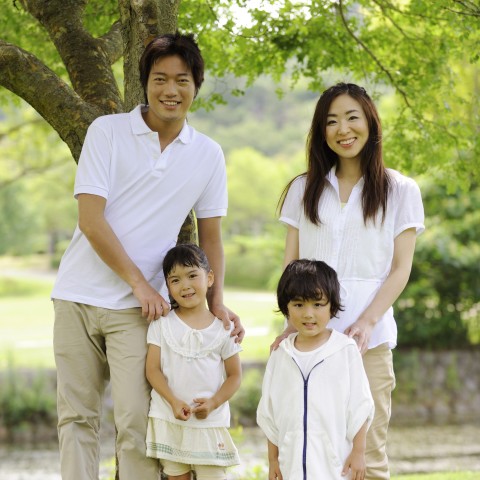Regardless of nationality or native language, family is the basic institution for everyone. So it makes sense for you to learn how to describe family members when you learn a new language. For Thai people, family is very important. So by learning about the family in Thai, you’ll get to know more about Thai family culture and Thai family values.
The basic questions most Thai learners have when attempting a Thai conversation about family are about how to say “father” in Thai, how to say “mother” in Thai, and how to say “sister” in Thai. In this article, we’ll answer all of these questions for you, and give you everything you need to know about Thai family. For easy understanding, study the family tree in Thai and English below.
- Family in Thai
- Thai Terms for Family Members
- Thai Terms for Relatives
- Thai Terms for Additional Family from Marriage
- Interesting Things You Should Know About Thai Family
- Thai Proverbs About Family
- How ThaiPod101 Can Help You Master Thai Language & Culture
1. Family in Thai
First, let’s learn about Thai family life in general, and family in Thai culture. What is family in Thailand?
When it comes to family life in Thai culture and society, people value the family institution. You can see that family members in Thai society are pretty close to each other; also note that family values in Thailand tend to revolve around seniority.
For this reason, Thai people don’t call people who are older than them by their name alone, but rather a term based on seniority and relationship. In other words, they call them by the appropriate family term together with their name. Before we go too much more into depth here, let’s learn some basic vocabulary and family words in Thai.
First and foremost, how do you say “family” in Thai?
1- Family in Thai
Thai: ครอบครัว (khrâawp-khruua)
Example:
ครอบครัวของเราอาศัยอยู่ที่ภาคใต้
khrâawp-khruua khǎawng rao aa-săi yùu thîi phâak dtâi
“Our family lives in the southern part of Thailand.”
Additional note: In Thai society, people normally live with their family. It’s perfectly normal for people who are of age to stay with their parents. Thai people usually move out when they start their own family or if they have to work far from home.
2- Family Members in Thai
Thai: สมาชิกในครอบครัว (sà-maa-chík nai khrâawp-khruua); คนในครอบครัว (khon nai khrâawp-khruua)
Example:
คนในครอบครัวของเราผมหยิกกันหมด
khon nai khrâawp-khruua khǎawng rao phŏm yìk gan mòt
“Every one of our family members has curly hair.”
3- Relatives in Thai
Thai: ญาติ (yâat)
Example:
ญาติของเราจะมารวมตัวกันในวันตรุษจีนทุกปี
yâat khǎawng rao jà maa ruuam dtuua gan nai wan dtrùt jiin thúk bpii
“Our relatives gathering is on the Lunar New Year day every year.”
4- Sibling in Thai
Thai: พี่น้อง (phîi náawng)
Example:
พ่อมีพี่น้องทั้งหมด 3 คน
phâaw mii phîi náawng tháng mòt săam khon
“My father has three siblings.”
2. Thai Terms for Family Members
Now, let’s begin learning what to call family members in Thai. We’ll start with family terms in a single family first.
1- Father in Thai
Thai: There are two words for father in Thai, as shown below:
- พ่อ (phâaw) is “father” in Thai.
- บิดา (bì-daa) is the formal written language for “father” in Thai.
Example:
พ่อของฉันชื่อธีระ
phâaw khǎawng chăn chûue thii-rá
“My father’s name is Teera.”
How to address/endearment terms: There are many ways for children to address their father in Thailand. Using พ่อ (phâaw) is okay, but many people also use ป๊ะป๋า (bpá-bpǎa), ปะป๊า (bpà-bpáa), ป๊า (bpáa), แดดดี๊ (daddy), and เตี่ย (dtìia).
Additional note: Thai people really love King Rama IX, so we call him พ่อของแผ่นดิน (phâaw khǎawng phàaen-din), which means “father of Thai people” in Thai. (Its literal meaning is Father of the Land.)
2- Mother in Thai
Thai: There are two words for “mother” in Thai, as shown below:
- แม่ (mâae) is “mother” in Thai.
- มารดา (maan-daa) is the formal written language for “mother” in Thai.
Example:
แม่ของฉันชอบไปทะเล
mâae khǎawng chăn châawp bpai thá-lee
“My mother likes to go to the sea.”
How to address/endearment terms: Similar to “father,” there are many ways for children to address their mother in Thailand as well. Apart from แม่ (mâae), Thai people also use หม่าม๊า (màa-máa), หม่ามี๊ (màa-míi), and ม๊า (máa).
Additional note: You may be able to guess this after reading about the terms for “father.” Since Thai people called King Rama IX พ่อของแผ่นดิน (phâaw khǎawng phàaen-din), it makes sense for us to call the wife of King Rama IX แม่ของแผ่นดิน (mâae khǎawng phàaen-din), which means “mother of Thai people” in Thai. (Its literal meaning is Mother of the Land.)
3- Older Brother in Thai
Thai: พี่ชาย (phîi chaai)
Example:
พ่อของฉันมีพี่ชาย 1 คน
phâaw khǎawng chăn mii phîi chaai nùeng khon
“My father has one older brother.”
How to address/endearment terms: In Thai, people call a sibling who is older than them พี่ (phîi) + name, regardless of their sibling’s gender. For example, according to the family tree, my father calls his older brother พี่ธำรง (phîi tham-rong).
Additional note: You may hear Thai-Chinese people use the term เฮีย (hiia) for an older brother as well.
4- Older Sister in Thai
Thai: พี่สาว (phîi sǎao)
Example:
พี่สาวของพ่อชื่อธารา
phîi sǎao khǎawng phâaw chûue thaa-raa
“The name of my father’s older sister is Tara.”
How to address/endearment terms: In Thai, people call a sibling who is older than them พี่ (phîi) + name, regardless of their sibling’s gender. For example, according to the family tree, my father calls his older sister พี่ธารา (phîi thaa-raa).
Additional note: You may hear Thai-Chinese people use the term เจ้ (jêe) for an older sister as well.
5- Younger Brother in Thai
Thai: น้องชาย (náawng chaai)
Example:
น้องชายของพ่อหน้าตาเหมือนพ่อมาก
náawng chaai khǎawng phâaw nâa dtaa mǔuean phâaw mâak
“My father’s younger brother looks a lot like my father.”
How to address/endearment terms: In Thai, there are two ways to address your younger sibling. People either call a sibling who is younger than them น้อง (náawng) + name regardless of their gender, or just call him by name. Most people use the second option. This is because of the focus on seniority in Thai culture.
6- Younger Sister in Thai
Thai: น้องสาว (náawng sǎao)
Example:
แม่มีน้องสาวที่อายุห่างกัน 2 ปี 1 คน
mâae mii náawng săao thîi aa-yú hàang gan sǎawng bpii nùeng khon
“My mother has one younger sister who is two years younger.”
How to address/endearment terms: In Thai, there are two ways to address your younger sibling. People either call a sibling who is younger than them น้อง (náawng) + name regardless of their gender, or just call her by name. Most people use the second option. This is because of the focus on seniority in Thai culture.
3. Thai Terms for Relatives
Let’s learn even more about family members in a bigger family, otherwise known as the extended family in Thailand. This section will show you what to call your father and mother’s family members, and other relatives.
1- Grandfather in Thai
Thai: There are two words for “grandfather” in Thai:
- ปู่ (bpùu) means “father of your father” in Thai.
- ตา (dtaa) means “father of your mother” in Thai.
Example:
ทั้งคุณปู่และคุณตาของฉันแข็งแรงมาก
tháng khun bpùu láe khun dtaa-khǎawng chăn khăaeng-raaeng mâak
“Both of my grandfathers are very healthy.”
How to address/endearment terms: Normally, when Thai people address their grandfather, they just call them ปู่ (bpùu) or ตา (dtaa). Thai people don’t use their grandfather’s name when they call them.
Additional note: In Thai society, grandparents are known to unintentionally spoil their grandchild. They tend to buy things for their grandchild and grant their wishes.
2- Grandmother in Thai
Thai: Similar to “grandfather,” there are two words for “grandmother” in Thai:
- ย่า (yâa) means “mother of your father” in Thai.
- ยาย (yaai) means “mother of your mother” in Thai.
Example:
คุณย่าทำอาหารไทยอร่อยมากในขณะที่คุณยายทำขนมไทยอร่อย
khun yâa tham aa-hăan thai à-ràauy mâak nai khà-nà thîi khun yaai tham khà-nŏm thai à-ràauy
“One of my grandmothers can cook delicious Thai food, while the other one can cook delicious Thai sweets.”
How to address/endearment terms: Like “grandfather,” when Thai people address their grandmother, they just call them ย่า (yâa) or ยาย (yaai). Thai people don’t use their grandmother’s name when they call them.
3- Great-Grandfather and Great-Grandmother in Thai
Thai: ทวด (thûuat)
Example:
แม่เล่าให้ฟังว่าทวดรำไทยสวยมาก
mâae lâo hâi fang wâa thûuat ram thai sŭuai mâak
“Mom told me that my great-grandmother did Thai dancing very beautifully.”
How to address/endearment terms: Like with grandparents, when Thai people address their great-grandparent, they just call them ทวด (thûuat). Thai people don’t use their great-grandparent’s name when they call them, unless they want to specify which great-grandparent they’re referring to.
4- Uncle in Thai
Thai: There are many words for “uncle” in Thai, which we’ll explain below:
- ลุง (lung) means “older brother of both father and mother” in Thai.
- น้า (náa) means “younger sibling, including younger brother of your mother” in Thai.
- อา (aa) means “younger sibling, including younger brother of your father” in Thai.
Example:
พ่อกับอาธนินท์ชอบดูฟุตบอลด้วยกัน
phâaw gàp aa thá-nin châawp duu fút-baawn dûuai gan
“Dad and Uncle Tanin like to watch football together.”
How to address/endearment terms: In Thai, there are two ways of addressing your uncle. Thai people either call their uncle ลุง (lung) / น้า (náa) / อา (aa) + name, or just call them ลุง (lung) / น้า (náa) / อา (aa). Most people use the first option to prevent confusion, in case there are many uncles in your family.
Additional note: The words น้า (náa) and อา (aa) can be used for both genders. So it can mean either “uncle” or “aunt.”
5- Aunt in Thai
Thai: There are many words for “aunt” in Thai, which we’ll explain below:
- ป้า (bpâa) means “older sister of both father and mother” in Thai.
- น้า (náa) means “younger sibling, including younger sister of your mother” in Thai.
- อา (aa) means “younger sibling, including younger sister of your father” in Thai.
Example:
น้ากนิษฐ์บอกว่าฉันดูเหมือนแม่ของฉันตอนเด็ก ๆ มาก
náa gà-nít bàawk wâa chăn duu mǔuean mâae khǎawng chăn dtaawn dèk dèk mâak
“Aunt Kanit said I really look like my mom when she was young.”
How to address/endearment terms: Similar to “uncle,” there are two ways to address your aunt in Thai. Thai people either call their aunt ป้า (bpâa) / น้า (náa) / อา (aa) + name, or just call them ป้า (bpâa) / น้า (náa) / อา (aa). Most people use the first option to prevent confusion, in case there are many aunts in your family.
Additional note: When Thai people talk to people they don’t know or haven’t met before, like a food seller or a man at the bus stop, if those people seem like they’re their parents’ age, they address them as ลุง (lung) or ป้า (bpâa).
6- Nephew and Grandson in Thai
Thai: หลานชาย (lǎan chaai)
Example:
ปู่บอกว่าตอนพี่ชายเกิด ปู่ดีใจมากที่มีหลานชาย
bpùu bàawk wâa dtaawn phîi chaai gòoet · bpùu dii jai mâak thîi mii lăan chaai
“My grandfather said when my older brother was born, he was so happy to get a grandson.”
How to address/endearment terms: Because of seniority, grandparents, uncles, and aunts normally call their nephews or grandsons by name.
7- Niece and Granddaughter in Thai
Thai: หลานสาว (lǎan sǎao)
Example:
ตาบอกว่า ยายรักฉันมากเพราะฉันหน้าตาเหมือนยายตอนสาว ๆ
taa-bòk-wâa yaai-rák-chǎn-mâk-prór-chǎn-nhâa-taa-mǎaeun-yaai-ton-sǎo-sǎo
“My grandfather said my grandmother loves me so much because I look like her when she was young.”
How to address/endearment terms: Like nephews & grandsons, grandparents, uncles, and aunts normally call their nieces and granddaughters by name due to seniority.
8- Cousin in Thai
Thai: ลูกพี่ลูกน้อง (lûuk-phîi-lûuk-náawng)
Example:
กนกเป็นลูกพี่ลูกน้องของฉัน
Gà-nòk bpen lûuk-phîi-lûuk-náawng khǎawng chǎn
“Kanok is my cousin.”
How to address/endearment terms: If your cousin is older than you, you have to call him/her พี่ (phîi) + name. But if he/she is younger than you, you can call him/her by name.
4. Thai Terms for Additional Family from Marriage
Your family normally gets bigger through marriage. So this part of the article will teach you what to call your new family members and in-laws.
1- Husband in Thai
Thai: There are two words for “husband” in Thai, which we’ll explain below:
- สามี (sǎa-mii) is the formal way to address the “husband” in Thai.
- ผัว (phǔua) is the informal way to address the “husband” in Thai.
Example:
สามีของป้ากนิษฐ์ชื่อน้าปิติ
Sǎa-mii khǎawng bpâa gà-nít chûue náa bpì-dtì
“The husband of Aunt Kanit is Piti.”
How to address/endearment terms: A husband and wife will usually call each other by name, or by a pet name. However, once they have a child, they usually begin to call each other the terms of “father” and “mother.”
2- Wife in Thai
Thai: There are two words for “wife” in Thai, which we’ll explain below:
- ภรรยา (phan-rá-yaa) is the formal way of addressing the “wife” in Thai.
- เมีย (miia) is the informal way of addressing the “wife” in Thai.
Example:
ป้าส่องศรีเป็นภรรยาของลุงธำรง
bpâa sàawng-sǐi bpen phan-rá-yaa khǎawng lung tham-rong
“Aunt Songsri is Uncle Tamrong’s wife.”
How to address/endearment terms: A husband and wife will usually call each other by name, or a pet name. However, once they have a child, they usually begin calling each other by the terms for “father” and “mother.”
3- Son in Thai
Thai: There are two words for “son” in Thai:
- ลูกชาย (lûuk chaai) is “son” in Thai.
- บุตร (bùt) is the formal written language for “son” in Thai.
Example:
ลูกคนแรกของปู่เป็นลูกผู้ชาย
Lûuk khon râaek khǎawng bpùu bpen lûuk phûu-chaai
“The firstborn of my grandfather is a son.”
How to address/endearment terms: Thai parents normally call their child by name.
4- Daughter in Thai
Thai: There are two words for “daughter” in Thai:
- ลูกสาว (lûuk sǎao) is “daughter” in Thai.
- ธิดา (thí-daa) is the formal written language for “daughter” in Thai.
Example:
ยายมีลูกสาว 2 คน
yaai mii lûuk sǎao sǎawng kgon
“My grandmother has two daughters.”
How to address/endearment terms: Thai parents normally call their child by name.
5- Mother-in-law in Thai
Thai: There are two words for “mother-in-law” in Thai:
- แม่ยาย (mâae-yaai) is the title for the wife’s mother in Thai.
- แม่สามี (mâae sǎa-mii) is the title for the husband’s mother in Thai.
Example:
ย่าเป็นแม่สามีของป้าส่องศรี
Yâa bpen maâe sǎa-mii khǎawng bpâa sàawng-sǐi
“My grandmother is the mother-in-law of Aunt Songsri.”
How to address/endearment terms: When a wife addresses a parent of her husband, or a husband addresses a parent of his wife, they use the terms “father” and “mother” as if they are their own parents. The words แม่ยาย (mâae-yaai) and แม่สามี (mâae sáa-mii) are used as third-person pronouns.
6- Father-in-law in Thai
Thai: There are two words for “father-in-law” in Thai:
- พ่อตา (phâaw-dtaa) is the title for the wife’s father in Thai.
- พ่อสามี (phâaw sǎa-mii) is the title of the husband’s father in Thai.
Example:
ตาเป็นพ่อตาของน้าปิติ
Dtaa bpen phâaw-dtaa khǎawng náa bpì-dtì
“My grandfather is father-in-law of Uncle Piti.”
How to address/endearment terms: When a wife addresses a parent of her husband, or a husband addresses a parent of his wife, they use the terms “father” and “mother” as if they are their own parents. The words พ่อตา (phâaw-dtaa) and พ่อสามี (phâaw sáa-mii) are used as third-person pronouns.
7- Female In-law in Thai
Thai: When your male family member gets married, the woman he marries is called สะใภ้ (sà-phái). Here are the terms of สะใภ้ (sà-pái) you should know:
- ลูกสะใภ้ (lûuk sà-phái) is the title for your son’s wife in Thai.
- พี่สะใภ้ (phîi sà-phái) is the title for your older brother’s wife in Thai.
- น้องสะใภ้ (náawng sà-phái) is the title of your younger brother’s wife in Thai.
- หลานสะใภ้ (lǎan sà-phái) is the title of your grandson’s or nephew’s wife in Thai.
Example:
ป้าส่องศรีเป็นพี่สะใภ้ของพ่อ
bpâa sàawng-sǐi bpen phîi sà-phái khǎawng phâaw
“Aunt Song-sri is my father’s sister-in law.”
How to address/endearment terms: The terms of สะใภ้ (sà-phái) listed above are like titles, and are used as third-person pronouns. Parents, aunts, and uncles of the husband normally call their daughter-in-law by name. The brother and sister of the husband use the terms พี่ (phîi) or น้อง (náawng) + name, depending on their age.
8- Male In-law in Thai
Thai: When your female family member gets married, the man she marries is called เขย (kěay). Here are the terms of เขย (khǒoei) you should know:
- ลูกเขย (lûuk khǒoei) is the title of your daughter’s husband in Thai.
- พี่เขย (phîi khǒoei) is the title of your older sister’s husband in Thai.
- น้องเขย (náawng khǒoei) is the title of your younger sister’s husband in Thai.
- หลานเขย (lǎan khǒoei) is the title of your granddaughter’s or niece’s husband in Thai.
Example:
น้าปิติเป็นน้องเขยของแม่
náa bpì-dtì bpen náawng khǒoei khǎawng mâae
“Uncle Piti is my mother’s brother-in-law.”
How to address/endearment terms: The terms of เขย (khǒoei) listed above are like a title, and are used as third-person pronouns. Parents, aunts, and uncles of the husband normally call their daughter-in-law by name. The brother and sister of the husband use the terms พี่ (phîi) or น้อง (náawng) + name, depending on their age.
5. Interesting Things You Should Know About Thai Family
Now that you know all the terms for family members, let’s learn some more things about the Thai family.
1- Terms about Children
Apart from ลูกชาย (lûuk chaai) and ลูกสาว (lûuk sǎao), the following terms can be used to describe your children as well.
- ลูกคนเดียว (lûuk khon diiao) is “single child”
- ลูุกคนโต (lûuk khon dtoo) is “eldest child”
- ลูกคนกลาง (lûuk khon glaang) is “middle child”
- ลูกคนเล็ก (lûuk khon lék) is “youngest child”
- ลูกชายคนโต (lûuk chaai khon dtoo) is “eldest son”
- ลูกชายคนกลาง (lûuk chaai khon glaang) is “middle son”
- ลูกชายคนเล็ก (lûuk chaai khon lék) is “youngest son”
- ลูกสาวคนโต (lûuk sǎao khon dtoo) is “eldest daughter”
- ลูกสาวคนกลาง (lûuk sǎao khon glaang) is “middle daughter”
- ลูกสาวคนเล็ก (lûuk sǎao khon lék) is “youngest daughter”
2- Politeness
If you want to talk politely or formally when addressing or talking about a family member or relative, you can put the word คุณ (khun) before the term, such as in คุณตา (khun dtaa). Further, you should end the sentence with ครับ (khráp) for a male speaker, or ค่ะ (khà) for a female speaker.
6. Thai Proverbs About Family
In the Thai language, people usually use proverbs in conversation. Here’s a list of Thai proverbs about family you can use if you want to sound like a Thai native.
1- ลูกไม้หล่นไม่ไกลต้น
Thai pronunciation: lûuk-mái lòn mâi glai dtôn
Literal meaning: “Fruit doesn’t fall far from its tree.”
Meaning: Children are often similar to their parent (in terms of behavior).
Similar English idiom: “Like father, like son,” and “The apple doesn’t fall far from the tree.”
Example:
ต้นทำอาหารเก่งเหมือนพ่อเลย ลูกไม้หล่นไม่ไกลต้นจริง ๆ
dtôn tham aa-hăan gèeng mǔuean phâaw looei lûuk-mái lòn mâi glai dtôn jing jing
“Ton is very good at cooking like his father.”
2- ดูนางให้ดูแม่
Thai pronunciation: duu naang hâi duu mâae
Literal meaning: “Look at her mother to look at her.”
Meaning: If you want to know what a woman likes, look at her mother.”
Similar English idiom: “A chip off the old block.”
Example:
หลานสะใภ้ชั้นไม่ดูแลบ้านให้เรียบร้อย นิสัยเหมือนแม่เค้าเลย ดูนางให้ดูแม่จริง ๆ
lăan sà-phái chán mâi duu-laae bâan hâi rîiap-ráauy ní-săi mǔuean mâae kháo looei duu naang hâi duu mâae jing jing
“My nephew’s wife doesn’t clean her house well, really like her mother. If you want to know what a woman likes, you really have to look at her mother.”
3- สามีเป็นช้างเท้าหน้า ภรรยาเป็นช้างเท้าหลัง
Thai pronunciation: săa-mii bpen cháang tháo nâa phan-rá-yaa bpen cháang táo lăng
Literal meaning: “Husband is elephant’s forefoot. Wife is elephant’s hind foot.”
Meaning: The husband is the leader of the family, while the wife is a good follower.
Similar English idiom: “It’s a sad house where the hen crows louder than the cock.”
Example:
ครอบครัวสมัยก่อน สามีทำงานหาเงิน ภรรยาดูแลครอบครัว ถือว่าสามีเป็นช้างเท้าหน้า ภรรยาเป็นช้างเท้าหลัง
khrâawp-khruua sà-măi gàawn săa-mii tham ngaan hăa ngooen phan-rá-yaa duu-laae khrâawp-khruua thǔue wâa săa-mii bpen cháang tháo nâa phan-rá-yaa bpen cháang tháo lăng
“For family in the past, the husband was the one who worked for money, while the wife looked after the family. It can be said that the husband is the leader of the family, while the wife is a good follower.”
4- รักวัวให้ผูก รักลูกให้ตี
Thai pronunciation: rák wuua hâi phûuk rák lûuk hâi dtii
Literal meaning: “If you love your ox, tie it up. If you love your child, hit him/her.”
Meaning: “As a parent, you need to punish your children when they do the wrong thing.”
Similar English idiom: “Spare the rod, spoil the child.”
Example:
เมื่อเห็นลูกทำผิด ต้องลงโทษ อย่าคิดว่าไม่เป็นไร รักวัวให้ผูก รักลูกให้ตี
mûuea hĕn lûuk tham phìt dtâawng long thôot yàa khít wâa mâi bpen rai rák wuua hâi phûuk rák lûuk hâi dtii
“When your child does the wrong thing, you have to punish them. Don’t think it’s okay. As a parent, you need to punish your children when they do the wrong thing.”
7. How ThaiPod101 Can Help You Master Thai Language & Culture
Congratulations on reaching this point! You’ve learned everything you need to know about Thai family, including how to say “family” in Thai and other essential family in Thai terms. Some terms are different from those in English, but with a little practice, you can use them well in no time.
And once you get used to all of these, go and learn other interesting topics at ThaiPod101.com. For example, learn about Thai national holidays, tourist attractions in Thailand, and traveling phrases you should know to plan for a trip to Thailand.
Before you go, let us know in the comments how you feel about family terms in Thai now. More comfortable, or is there still something you’re struggling with? We look forward to hearing from you!
While you’re at it, why not practice talking about family in Thai writing? If you want, write us a paragraph about your family written in Thai!



















